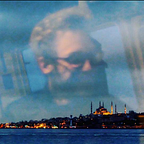Tired people of the middle east
Too tired to get along..
A little while ago, I discovered Marjan Farsad, a lovely Iranian singer and animator with a voice as soft as silk. I decided to use one of her songs as material for learning Persian, “Khooneye Ma”.
I spent hours looking up each word in the dictionary, to make sense of the sentences. Once I understood everything on paper, I tried to listen to it while following the text. The next step was to quickly write down the lyrics as I listened to the song.
A few hours later, I was going out for a movie. So I decided to put on my earphones and listen to the song as I was walking to the theater. After spending hours studying this song, finally I was able to comprehend each word as I was hearing them. All of a sudden, the words, the meaning, the melody everything came together and pushed a single drop of tear down my cheek when I heard the following quatrain.
Our home has stories خونه ما قصه داره
It has cherries and pistachios آلبالو و پسته داره
Behind the warm smiles پشت خندههایِ گرمش
It has tired people آدمای خسته داره
This part made me very emotional for a brief second because all of a sudden it helped me digest a deep internal conflict that was hard to deal with.
I, like many others from Turkey, or Iran or many other countries of the region, come to Europe or America to study, to work, leaving our families and friends behind. Most times we leave telling ourselves we are going to a better place where they will know our worth. We leave with anger to those who rule our lands. We leave with disappointments about how we and others have been treated. We leave with broken dreams about how we could be living in our homelands among our loved ones, the possible future that is taken away from us. We leave with a lot of complaints, trying to convince ourselves that we are doing the right thing.
But the truth this piece of poetry communicates is the fact that back home, with its bitterness and sweetness, we have stories, stories that make us who we are. They are stories that shape our identity, our language, our names. Back home we have cherries and pistachios and countless other beautiful tastes each of which means something distinct to every one of us. Back home, we have warm smiles in the faces of millions, we hug each other, kiss each other, touch each other with warmth and friendliness.
However behind those warm smiles, there are tired people. They are very tired. Exactly because of those stories. Everyone has his or her own bitter stories. Even though they can put on a warm smile, they are so tired that it’s hard to have sympathy for others’ suffering. It gives birth to immense cruelty for one another.
The movie I saw that day was “The Insult”. It’s the Academy Award nominee from Lebanon. It tells a story of a minor conflict between a Palestinian refugee and a Christian Lebanese man that grows into a national conflict. A man who simply asks for an apology for an insult, finds in front of himself a man that can’t bring himself to apologize. They both have deep angers for the past. They are both victims in their own stories yet they are confronted with each other.
Towards the end of the movie, the lawyer of the Christian man talks about the clashes that took in his client’s village during his childhood. No one in the court had thought about it up to that moment. He makes the point that while everyone is talking about the sufferings of the Palestinian refugees, the situation is not as simple as that.
Every side in this region has suffered immensely. Yes, the Palestinians have suffered and lost their homes. Jews in Israel have been under attack since the day their country was founded. Jews in Arab countries had to leave their homes. Kurds have been living under oppression without a homeland. Iran had a bloody revolution; Iraq and Syria have been destroyed in wars.
All these stories of the past are just being fuel to the fire. Maybe what we need is what the Palestinian man in the movie couldn’t do: An apology. We all start with a blank slate, find a certain level of inner peace by trying to understand the chain of events that lead to such sufferings and move on. I know this is not a realistic future for the middle east, but one can dream right?
I want to dream of a future where Kurds and Turks and Arabs and Persians and Jews, we all live together in peace, travel from Halep to Erbil, from Tehran to Haifa, from Istanbul to Beirut, without fear, without worries; just for the apricots and the cherries and the pistachios, just to celebrate and enjoy the beauty of this ancient land and its cultures, music and languages and most importantly, its people.
